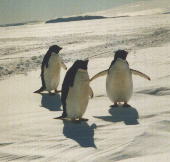

Introducing PROJECT EXPLORE...
A Curriculum Development and Research Activity of the
MECC/University of Minnesota Center
for the Study of Educational Technology
Using the services of the
LEARNING LINK NATIONAL CONSORTIUM
With Additional Funding from Panasonic Corporation
*********
WHAT IS PROJECT EXPLORE?
Project Explore will develop a set of ten curriculum modules, each
containing several classroom activities, relating to the geography,
biology, meteorology, geology, and environment of the Antarctic
continent. These modules, designed for use in grades 6-9, will
emphasize problem solving skills. They will be developed by a team of
educators, including staff from the MECC/UM Center for the Study of
Educational Technology, content experts, and classroom teachers.
The modules will be partially based on data being transmitted back
from the Trans-Antarctica Expedition, the seven-month history-making
crossing of the Antarctic continent by an international team of
explorers, led by Will Steger
(USA) and Dr. Jean-Louis Etienne (France), using only dog sled
transportation. The Expedition departed on its epoch journey on July
27, 1989.
The modules will be developed during fall 1989 for availability to
schools beginning in January 1990, when the Expedition will have
reached its mid-point. The modules are disseminated via the LEARNING
LINK Telecommunications network. The purpose of using this
technological method is to allow "immediate" availability of
activities developed while the Expedition is in progress, continual
updating of Expedition data as it is received, and sharing of
instructional ideas by teachers using the activities. The MECC/UM
Center is using several classroom sites as a research environment to
learn more about the viability of using on-line curriculum
dissemination.
.
WHAT IS THE TRANS-ANTARCTICA EXPEDITION?
During July, 1989 - March, 1990, an international team of six
explorers, representing the United States, France, USSR, Great
Britain, China, and Japan, will cross the Antarctic continent by
dogsled. The Expedition is the first non-mechanised crossing and the
longest traverse of the continent. Its goals are to increase world
awareness of Antarctica, collect data about one of the world's most
important and remote ecological systems, and demonstrate the power and
spirit of international cooperation.
WHAT WILL PROJECT EXPLORE PROVIDE TEACHERS?
Each of the nine Antarctica curriculum modules developed by Project
Explore contains the following:
-content and process objectives;
-teacher background information;
-list of materials needed;
-classroom activities;
-student evaluation forms.
Project Explore also gives teachers an opportunity to interact with
experts on the subject of Antarctica, providing a source of
information and answers to content questions. In addition, a
Discussion topic is available that allows teachers to communicate with
each other to share teaching ideas related to classroom activities.
THE MECC/UM CENTER
The MECC/University of Minnesota Center for the Study of Educational
Technology was founded in 1987 as a research partnership between MECC,
a leading educational technology company, and the University of
Minnesota College of Education, a major research institution. Each
year the Center conducts and sponsors research studies, carries out
service activities, and disseminates research results in the field of
educational technology. For more information on the MECC/UM Center,
please call 612-481-3677.
**********************************************************************
PROJECT EXPLORE
......................................................................
What do you want to do?
[1] Project Explore Overview
[2] Instructional Modules Overview
[3] Project Explore Discussion Center Topic
(see choice [M] Discussion Center)
[4] Abstracts of Instructional Modules
[5] Project Explore Instructional Modules
[6] Project Explore Formative Evaluation Materials
**********************************************************************
PROJECT EXPLORE - INSTRUCTIONAL MODULES OVERVIEW
......................................................................
EXPLANATION OF MODULE FORMAT
The major goal of the lesson modules is to help students develop a
rich knowledge base about Antarctica. To this end the writers
attempted to create lessons which would enable students to give
descriptions and explanations, to make predictions, and to begin to
make informed decisions about Antarctica. Each module contains the
following components:
FOCUS QUESTION:
The title of the module. The focus question will ask the student to
describe, explain, predict, manage or decide something.
BACKGROUND INFORMATION:
Information to aid the teacher in answering the focus question.
Often a useful reference for students when completing activities in
the module.
EQUIPMENT or MATERIALS:
Everything needed to complete the module. Some of the materials
(maps, diagrams, etc.) needed to complete certain activities in the
modules are in a supplemental packet which can be ordered from MECC.
EXPLORATION/ASSESSMENT OF PRIOR KNOWLEDGE:
An activity designed to stimulate student interest in the topic and
provide an indication of students' prior knowledge of the topic. This
information is important for determining the starting point and level
of difficulty of instruction.
CONCEPT INVENTION ACTIVITY:
Similar to Madeline Hunter's "direct instruction." Activities for
providing new information to students.
APPLICATION ACTIVITIES:
Two or three activities in which students practice applying their new
knowledge. Typically the major portion of each module. Select one or
more of these activities.
EVALUATION:
Assessment of students' success in answering the focus question. The
exploration activity often can be used at the end of the instruction
as an evaluation tool.
RECOMMENDED PROCEDURE FOR USING MODULES:
1 - While online with LEARNING LINK, examine the modules.
2 - Download and save to disk those modules which seem appropriate
for your classes.
3 - Make whatever modifications seem necessary. (It was the goal of
the lesson writers to provide materials which generally could be used
"as is.")
4 - Run off copies of the modules for your students.
**********************************************************************